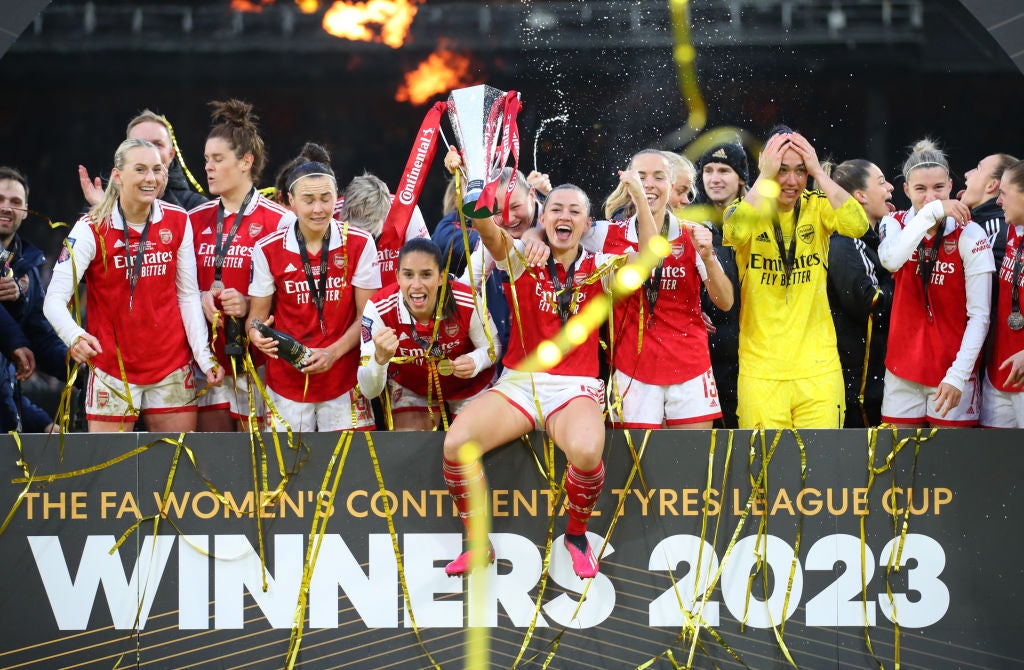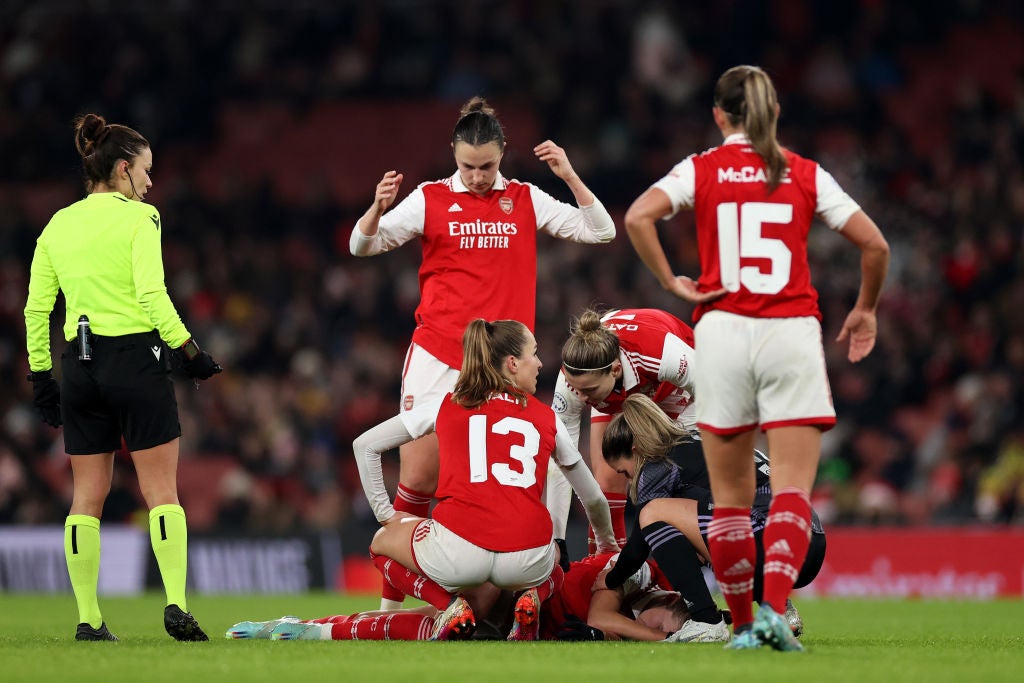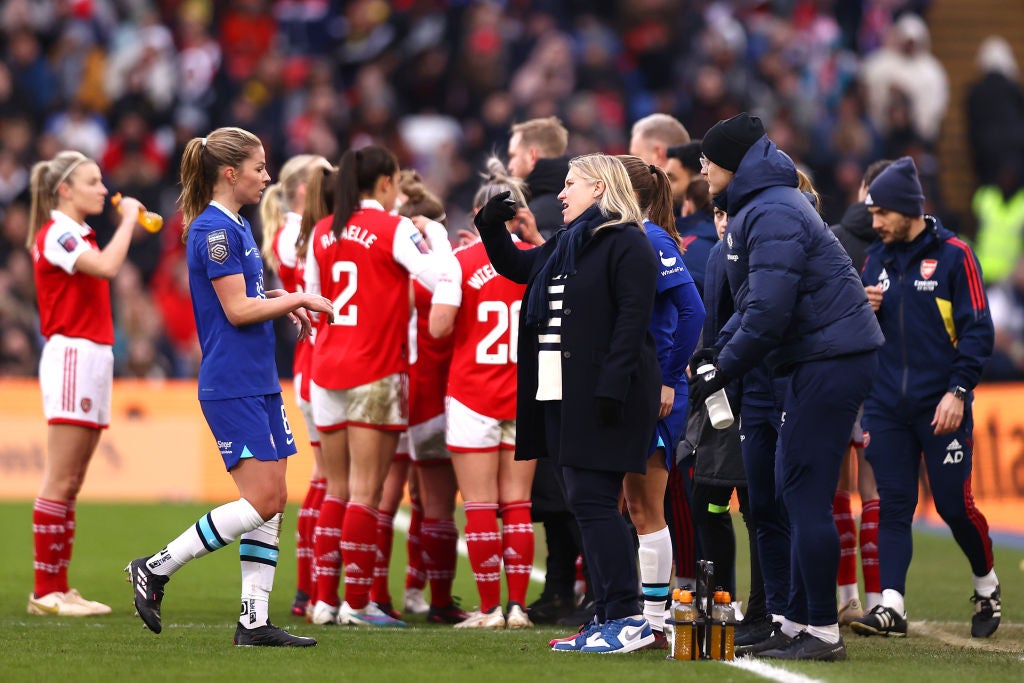Continental Cup final shows the promise and the problems of a hidden showpiece occasion
Arsenal came from behind to beat Chelsea 3-1 at Selhurst Park on Sunday

If only the Continental Cup could produce encounters like this more often. It is a tournament which is often synonymous with drab matches which act as little more than hurdles for teams to jump over to return to league football, yet Sunday’s final showed what this cup could have the capacity to do.
Chelsea, and particularly Arsenal, approached it with respect, entertaining the 19,010-strong crowd to an afternoon of football which wouldn’t have looked out of place at the climax of the Women’s Super League.
Strong squads were fielded, effort was seen and some of the slickest football seen this season was on display. It heralded unbridled jubilation for Arsenal as they danced to Neil Diamond and were joined by Ian Wright in the dressing room and – for the first time in a long time – it felt like the League Cup meant something.
The holes in that fairytale don’t take long to appear. Take the glaringly obvious: this is the final of a cup competition, yet each of the contenders were in the unique position of only having to win two games to reach such a stage.
It is a tournament which overwhelmingly provides a helping hand for those in the upper echelons of the league. For those competing in the Champions League, entry comes at the quarter-finals, avoiding the early-season slog and fixture congestion caused by the group stages.
Already successful? Enjoy the advantage you are granted. Vying to compete with those at the top? Tough luck.
That it comprises a group stage in itself causes issues. In a league plagued with injuries – you have to look no further than Arsenal absentees Vivianne Miedema and Beth Mead for evidence of such a fact – additional matches only add to the toll the calendar takes on players.
The pandemic has compressed an already difficult calendar into one fraught with worry. For those who competed at the Olympics in 2021, they were then condemned to summers consisting of a European Championships, World Cup, Olympics and another Euros before any summer respite could return. That means some players will not have a true end-of-season break until 2025.
This, predictably, leads to weakened teams being a consistent feature, as is true in the men’s game. Risking the highest-calibre players for a tournament which often means little can cause damage to your league hopes, and the rewards of league success take priority over all else.

Such sides in the earlier rounds, coupled with midweek nights broadcast only via the FA’s own streaming service, only advance the tournament’s devaluation. Its rounds can frequently become little more than a footnote on a team’s record, rather than a task to take seriously.
Maybe it was one of the most prominent statistics shared at full-time of the final which began to make it feel hollow: Arsenal have won this competition six times, and two-thirds of the titles have been shared between these sides. The other third? That’s entirely occupied by Manchester City, the other of the WSL’s dominant three.
While comparisons between the men’s and women’s game can be cliché and do little to contribute to proper analysis, the League Cup continues to have the ability to elicit moments of magic for those outside of the upper echelons who may find themselves consigned to their usual league status in men’s football.
Take Newcastle’s run to this season’s final for example. The North East marched on the capital in its droves after a run to the final generated nights which its supporters will cherish for years to come. Southampton, languishing in the league, beat Manchester City and gave a positive moment to an otherwise poor campaign.
For those lower in the pyramid the magic-inducing capacity is even more profound: just look at Lincoln City or Gillingham’s run to the last 16.
Yet that cannot happen in the women’s format. Only the top two tiers compete for the title, with the individual giant-killings lacking in importance if a team cannot do enough across a lengthy group stage to progress.
Even West Ham’s progression to the semis this year was met by little more than nonchalance by many. They were beaten 7-0 by Chelsea at that stage, a result expected by most.

So what could be done to address the Cup’s issues and finally make it a tournament fit for purpose? In 2019 Emma Hayes, Chelsea manager, suggested scrapping the tournament in its entirety, though recently it appears her allegiances have shifted with her targeting a move of the final to Wembley last week.
A move away from minor venues could help to increase the competition’s stature – fixtures at Wembley continue to carry a certain glamour – though that may not do enough to change its demeanour.
Outside of the EFL Trophy, group stages are a rarity in domestic cup competitions. Such a sizable advantage for the best also does little in the way of aiding its notoriety.
Midweek anonymity, rather than a weekend showpiece, sees its stature fade, as does a lack of regular broadcasting.
Solutions to the Women’s League Cup issues are varied, though there is consensus that change is necessary. After all, cup competitions are supposed to be the game’s highlight, not an obscurity.
Join our commenting forum
Join thought-provoking conversations, follow other Independent readers and see their replies
Comments
Bookmark popover
Removed from bookmarks